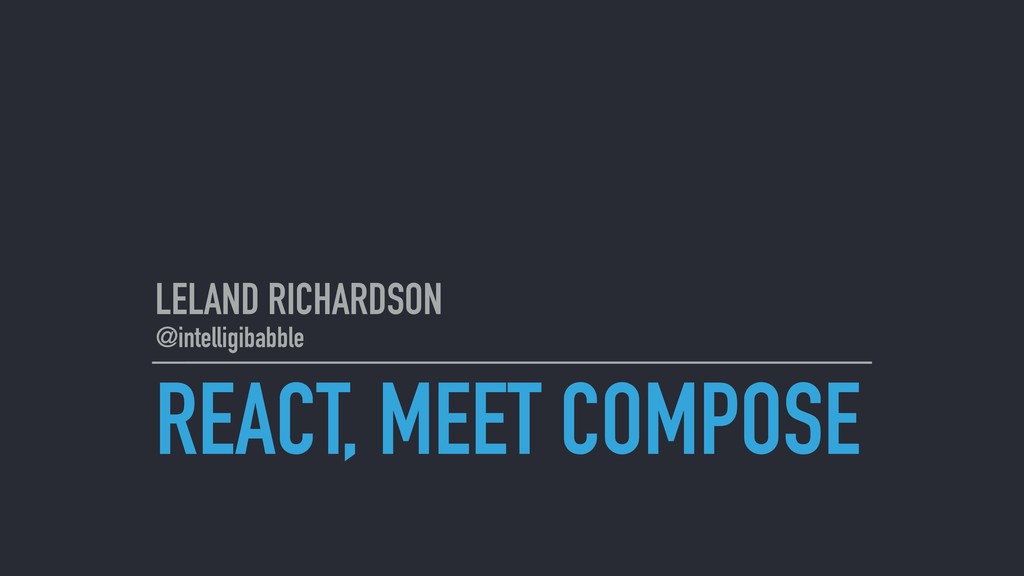#frontend-tech
2019-07-05
F.Lin
23:47:53
@frank07214 has joined the channel
2019-07-06
mofas
05:22:02
2005 - Prototype
2007 - MooTools
2006 - jQuery
2006 - Sass (no scss)
2006 - YUI
2009 - OOCSS
2006 - SCSS
2011 - SMACSS
2011 - Bootstrap
2011 - Grunt
2012 - BEM
2012 - Webpack
2013 - React
2013 - Gulp
2015 - Babel
2015 - CSS Modules
2016 - Styled Components
2016 - Create React App
2007 - MooTools
2006 - jQuery
2006 - Sass (no scss)
2006 - YUI
2009 - OOCSS
2006 - SCSS
2011 - SMACSS
2011 - Bootstrap
2011 - Grunt
2012 - BEM
2012 - Webpack
2013 - React
2013 - Gulp
2015 - Babel
2015 - CSS Modules
2016 - Styled Components
2016 - Create React App
mofas
05:22:06
好像還不完全
jihchi
08:02:04
這些 project 的出生年份?
2019-07-08
mrorz
11:00:42
我一直覺得在向 python 後端工程師推廣 graphql 時,graphene 一直都是絆腳石
⋯⋯ not anymore!
各位觀眾,可以寫 graphql schema language 的 python graphql server!
https://ariadnegraphql.org/
⋯⋯ not anymore!
各位觀眾,可以寫 graphql schema language 的 python graphql server!
https://ariadnegraphql.org/
ariadnegraphql.org
A Python library for implementing GraphQL servers using schema-first approach.
- 💯3
mrorz
2019-07-08 11:04:34
dataloader 還在 in progress
https://github.com/mirumee/ariadne/pull/60
https://github.com/mirumee/ariadne/pull/60
mrorz
2019-07-08 11:06:28
喔不對,看起來直接用 aiodataloader 就可以
https://github.com/mirumee/ariadne/pull/60#issuecomment-500053696
https://github.com/mirumee/ariadne/pull/60#issuecomment-500053696
mrorz
2019-07-08 11:08:20
但也有人用 aiodataloader 兜不起來 lol
https://github.com/mirumee/ariadne/issues/103
https://github.com/mirumee/ariadne/issues/103
mrorz
11:04:34
dataloader 還在 in progress
https://github.com/mirumee/ariadne/pull/60
https://github.com/mirumee/ariadne/pull/60
GitHub
:warning: Work in progress! TODO: Turn WSGI middleware into a generator Support query batching Add tests
mrorz
11:06:28
喔不對,看起來直接用 aiodataloader 就可以
https://github.com/mirumee/ariadne/pull/60#issuecomment-500053696
https://github.com/mirumee/ariadne/pull/60#issuecomment-500053696
GitHub
:warning: Work in progress! TODO: Turn WSGI middleware into a generator Support query batching Add tests
mrorz
11:08:20
但也有人用 aiodataloader 兜不起來 lol
https://github.com/mirumee/ariadne/issues/103
https://github.com/mirumee/ariadne/issues/103
GitHub
I'm not an expert in the python ecosystem, and am not sure what's required from me to support asynchronous resolvers in an Ariadne schema. If it's possible, I'd love a brief example...
2019-07-09
mrorz
10:34:02
nextjs.org
Next.js 9 includes TypeScript support, Dynamic Routing, API Routes, Automatic Static Optimization, and more!
- 👍1
2019-07-10
mofas
12:49:07
open source project距離我好遙遠呀...
mrorz
14:40:07
《CY與open source的距離》
jihchi
14:53:32
「只有 @mofas 沒有距離」
YZWind
17:38:59
@yzwind has joined the channel
2019-07-12
mofas
05:10:36
Today Facebook is open sourcing Hermes, a small and lightweight JavaScript engine optimized for running React Native on Android. We are currently publishing a new patch release for React Native which will contain Hermes as opt-in.
 2
2
2019-07-13
2019-07-17
mofas
09:57:40
So cool
2019-07-18
mofas
14:30:45
'Pair Programming' with GPT-2 trained on 2 million GitHub files. Straightforward near-term practical use of deep learning. I wish they had better examples - for example, I bet if you name a variable Gryffindor it will suggest Hufflepuff for the next one!
(link: https://tabnine.com/blog/deep) tabnine.com/blog/deep
(link: https://tabnine.com/blog/deep) tabnine.com/blog/deep
tabnine.com
TabNine is the all-language autocompleter. It uses machine learning to provide responsive, reliable, and relevant suggestions.
mofas
14:30:56
The right way to do code auto-complete
mofas
14:35:31
Speaker Deck
Jetpack Compose is a new declarative UI framework that is being developed in the open for Android. It has a very similar programming model to React, and this talk will dive deep into the internals of both to explain the similarities and differences in the architectures of both, and how React Native might be able to leverage some of this technology long term.
mofas
14:35:41
Google is so slow...
2019-07-21
2019-07-23
mofas
12:58:54
https://johncarlosbaez.wordpress.com/2019/07/20/applied-category-theory-2019-talks/
Want to know more about FP?
Want to know more about FP?
Azimuth
Applied Category Theory 2019 happened last week! It was very exciting: about 120 people attended, and they’re pushing forward to apply category theory in many different directions. The topics ranged from ultra-abstract to ultra-concrete, sometimes in the same talk. The talks are listed above — click for a more readable version. Below you can read what Jules Hedges and I wrote about all those talks: • Jules Hedges, Applied Category Theory 2019. I tend to give terse summaries of the talks, with links to the original papers or slides. Jules tends to give his impressions of their overall significance. They’re nicely complementary. You can also see videos of some talks, created by Jelle Herold with help from Fabrizio Genovese: • Giovanni de Felice, Functorial question answering. • Antonin Delpeuch, Autonomization of monoidal categories. • Colin Zwanziger, Natural model semantics for comonadic and adjoint modal type theory. • Nicholas Behr, Tracelets and tracelet analysis Of compositional rewriting systems. • Dan Marsden, No-go theorems for distributive laws. • Christian Williams, Enriched Lawvere theories for operational semantics. • Walter Tholen, Approximate composition. • Erwan Beurier, Interfacing biology, category theory & mathematical statistics. • Stelios Tsampas, Categorical contextual reasoning. • Fabrizio Genovese, idris-ct: A library to do category theory in Idris. • Michael Johnson, Machine learning and bidirectional transformations. • Bruno Gavranović, Learning functors using gradient descent • Zinovy Diskin, Supervised learning as change propagation with delta lenses. • Bryce Clarke, Internal lenses as functors and cofunctors. • Ryan Wisnewsky, Conexus AI. • Ross Duncan, Cambridge Quantum Computing. • Beurier Erwan, Memoryless systems generate the class of all discrete systems. • Blake Pollard, Compositional models for power systems. • Martti Karvonen, A comonadic view of simulation and quantum resources. • Quanlong Wang, ZX-Rules for 2-qubit Clifford+T quantum circuits, and beyond. • James Fairbank, A Compositional framework for scientific model augmentation. • Titoan Carette, Completeness of graphical languages for mixed state quantum mechanics. • Antonin Delpeuch, A complete language for faceted dataflow languages. • John van der Wetering, An effect-theoretic reconstruction of quantum mechanics. • Vladimir Zamdzhiev, Inductive datatypes for quantum programming. • Octavio Malherbe, A categorical construction for the computational definition of vector spaces. • Vladimir Zamdzhiev, Mixed linear and non-linear recursive types.
 2
2